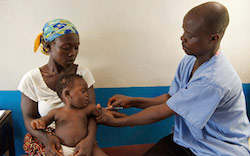As if 24,000 people being stricken and 10,000 people dying from Ebola in West Africa weren’t enough, now the area is being hit with a measles outbreak that could result in 2,000 to 16,000 children dying, according to a study released March 12 in the journal Science.
 The second of the one-two punch suffered by this population was predictable. Why? Because immunization programs get derailed in the wake of humanitarian crises of this magnitude, and that leads to outbreaks of vaccine-preventable diseases.
The second of the one-two punch suffered by this population was predictable. Why? Because immunization programs get derailed in the wake of humanitarian crises of this magnitude, and that leads to outbreaks of vaccine-preventable diseases.
The health care systems in Guinea, Liberia and Sierra Leone all but collapsed during the Ebola outbreak. Fear and panic ensued. Health care facilities were shuttered, and people stayed away from the few that remained open. Vaccine programs ceased. People began and continue to die from conditions that could’ve been treated such as childbirth, malaria, tuberculosis, HIV-AIDS, etc.
Health care outreach was to no avail. As Chico famously asked in the classic Marx Bros. film Duck Soup, “Who you gonna believe? Me or your own eyes?” Villagers could see with their own eyes that sick loved ones who entered hospitals and clinics left as corpses.
The measles outbreak in West Africa is understandable. The measles outbreak in this country is not.
Prior to the 1960s, about 3 to 4 million Americans got measles each year. Of those people, 400 to 500 died and 48,000 were hospitalized. A vaccine was developed and a campaign began in 1963. Both were so effective that by the year 2000, measles was declared eliminated in this country.
The ax fell in 1998 when the British medical journal The Lancet published a study by Andrew Wakefield, who lives in Austin. His study, which had only 12 subjects, linked the measles, mumps and rubella vaccine with autism.
As we know by now, news of his study ricocheted around the world, and use of the vaccine plummeted worldwide as an anti-vaccine movement was ushered in. The Lancet reassessed the scientific methods of the study and in 2010 retracted the study. Wakefield’s medical license was subsequently revoked, but the damage had been done.
When I began working as a staff nurse in neonatal intensive care in 1980, all my co-workers got the flu shot every year. All the babies got their immunizations. No questions, no doubt, no hesitation. Boom.
In 2009, Central Texas experienced a large pertussis outbreak, the first in 50 years. Pertussis in our hospital! With a shiver, we feared it was the canary in the coal mine. It was. About the same time, parents began to refuse to sign vaccine consents, and even nurses began questioning flu shots.
By the time I retired in 2012, it was obvious that a retreat from common sense was well underway. Imagine it being difficult to obtain consent from parents to protect their children from communicable, deadly diseases. The poor, uneducated parents didn’t hesitate; they were grateful their children could receive the vaccine. It was the educated parents, those empowered with all of the information in the world at their fingertips, who balked. Scientific reasoning did no good.
According to the Centers for Disease Control and Prevention, 644 cases of measles were reported in 2014 and 176 cases as of March 13. According to Texas State Department of Health data, in 2004 only 0.09 percent (just under 3,000 kids) of Texas’ overall school-age population had nonmedical exemptions to school immunization laws. But in the 2013-14 school year, that percentage jumped to 0.75 percent (more than 38,000 kids). That’s almost a 13-fold increase in 10 years.
Measles, arguably the most contagious disease known, makes you very sick. Fever may rise to 104 degrees or higher. It can kill you. It can blind you. It can cause swelling of the brain. Pregnant women exposed to measles can miscarry or give birth to infants with deformities.
Parents refusing to vaccinate their children makes about as much sense to me as countries that don’t educate their female children. Both are choices based on ideologies that defy reason; both can cause irreparable harm.

 Austin, Texas
Austin, Texas